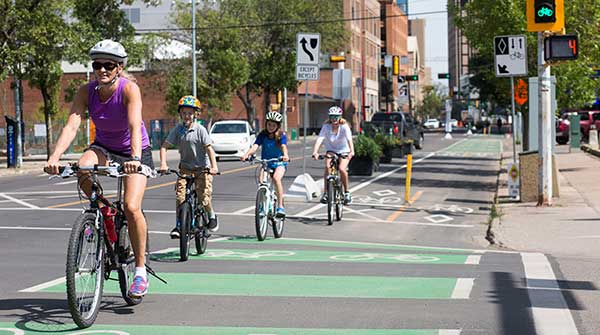Troubled electric buses, bicycle lane costs and high salaries of city officials add to Edmonton property tax woes
Edmonton City Council concluded its fall budget adjustment discussions yesterday, approving changes to the 2023-2026 budget that will increase property tax levy by 6.6 percent in 2024, 5.3 percent in 2025, and 4.7 percent in 2026. While these adjustments aim to address financial challenges, they have drawn criticism from the Canadian Taxpayers Federation (CTF).
“The city clearly has a spending problem and it’s wasting taxpayers’ money on electric buses that don’t work,” said Kris Sims, CTF Alberta Director.
 Kris Sims |
 Photo courtesy City of Edmonton |
| Related Stories |
| Edmonton unveils $5M Edge Fund program to help fuel city’s transformation
|
| Edmonton earns positive financial outlook from S&P
|
| Is Edmonton’s business future at risk?
|
While the city’s investment in electric buses totalled around $60 million, reports indicate that approximately 75 percent of these electric buses are plagued by maintenance issues, requiring frequent repairs and adjustments. Furthermore, the company responsible for manufacturing parts for this electric bus fleet has gone bankrupt.
Edmonton’s total spending has surged over the years, with a notable increase from $2.2 billion in 2014 to an estimated $3.4 billion in 2023, marking a 54 percent spending increase. This growth contrasts with the city’s population, which has increased by approximately 17 percent over the same period.
In another expenditure, Edmonton City Hall allocated $100 million for bicycle lanes last year despite facing challenging weather conditions with snow on the roads from September to May.
The city maintains the adjustments have been made to address higher-than-anticipated costs and lower-than-expected revenues and to ensure the city can continue to provide the 70 essential services outlined in the four-year budget. These services include maintaining infrastructure like roads, bridges, pathways, and transit systems, offering emergency services and social support, and activating various recreational facilities and parks.
Criticism has also been directed at the salaries of city officials, particularly Mayor Amarjeet Sohi, who receives an annual salary of $211,488. City councillors are paid $119,484 each, while the premier of Alberta earns $186,180 annually.
“The people of Edmonton should remember they have the option of recall legislation, and they can force a byelection for their city councillor if they think they’re doing a bad job,” noted Sims, highlighting the concerns of taxpayers regarding the tax hike and spending practices.
City Council also approved over $16 million in increased funding for various services, including:
- Operating the new Metro Line LRT to the new NAIT Station.
- Expanding bus service hours to enhance public transit accessibility and align with service standards.
- Increasing the response to encampments and support for unsheltered Edmontonians.
- Expanding library services at Heritage Valley.
- Advancing work on Edmonton’s Anti-Racism Strategy.
These adjustments come in addition to the $142.4 million in new operating funding approved by Council in December 2022. That funding included allocations for affordable housing, expanded transit services, increased snow and ice management, and energy transition and climate adaptation initiatives.
City Council made several changes in an attempt to reduce the tax increase, including leveraging an $8 million increase in the EPCOR dividend and identifying another $9 million in savings and efficiencies.
In terms of capital adjustments, City Council approved a $105 million increase to the capital budget, representing less than one percent of the approved $10.3 billion capital budget. These adjustments cover various projects, including acquiring 20 new diesel buses, delivering affordable housing projects, and investing in critical renewal projects like technology and equipment upgrades.
The property tax levy increase will impact property owners differently based on their property’s assessed value compared to the market. An average Edmonton household is expected to pay approximately $747 in property taxes for every $100,000 of assessed home value in 2024, representing an increase of $45 compared to 2023.
The fall supplemental operating and capital budget adjustments are part of the City Council’s multi-year budgeting approach, allowing the city to adapt to significant changes since the initial budget was established. The spring supplemental operating budget adjustment is scheduled for April 2024, followed by the capital budget adjustment in June 2024. Property assessments for 2024 will be sent out in January.
| Staff
To interview Kris Sims, click here.
The opinions expressed by our columnists and contributors are theirs alone and do not inherently or expressly reflect the views of our publication.
© Troy Media
Troy Media is an editorial content provider to media outlets and its own hosted community news outlets across Canada.
